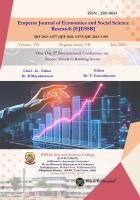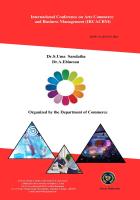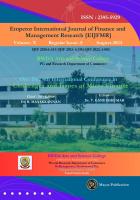- Home
- Books
-
Conference
- "INTERNATIONAL PERSPECTIVES ON RESEARCH METHODOLOGY: CHALLENGES AND OPPORTUNITIES"
- Artificial Intelligence in Finance and Economics
- Behavioral finance
- Day 5th International conference Recent Trends in Banking Sector
- International Conference on Innovations and Transformations Impacting Economy and Business in the Digital Era
- International Conference on Multidisciplinary Research Towards Sustainable Developmen
- International Conference on Social Science, Management and Technology Modern Era
- Two Day International Conference on Financial Innovation and Economic Development
- Emperor Award Name
- International Conference on Multidisciplinary Research
- Journals
- Research Projects
- Services
- Submit Article
- Video Gallery
The Indian Agricultural Growth Process: Issues and Perspectives
About the book
Description
PREFACE
The agriculture sector is one of the most important components of the Indian economy. It has been the backbone of the economy for ages and has gone through a paradigm shift from subsistence agriculture in the first half of the last century to a gradual commercial farming approach through crop diversification. Despite strong footing and performances, the growth of the agriculture sector in India has been fluctuating for a long period due to a lack of post-harvest infrastructure, poor utilization of land, low value-addition, and poor facility of packaging and distribution. The average growth in GDP from agriculture over the last more than one decade has been around 2.5 percent only. Over the past seven decades, the country has successfully transformed itself from a food deficit economy into a self-sufficient economy. The continuous rise in annual aggregate food grains production has helped India to not only meet its increasing demand but also to push exports to some extent. It also helped the country to accumulate a substantial quantity of food grains as buffer stocks to cope with any natural calamities. The rise in food grains production, despite a decline in the area under cultivation for total food grains, partly explains the rise in farm productivity. Data also suggest that over the availability and accessibility of food grains have improved. But still, productivity is constrained by various distortions in product and factor markets and government policy interventions must enhance the markets to be pro-farmers.
Increasing production and productivity are keys to the agricultural growth process. Equally important is to provide post-production infrastructure including fair markets. It is important to provide better infrastructure for connectivity, storage, and credit which can remove geographical isolation of markets and can help in bringing the farmer closer to consumers and, possibly enhance the bargaining capacity of the farmer. There are constant efforts to improve agricultural infrastructures across the country but the requirements of investments are phenomenally very high considering the vastness of agricultural production processes and, therefore, public and private investments need to be pushed. A preliminary look at the information on agricultural investment as a percentage of Gross Domestic Product (GDP) shows a decline from 3.9 percent in 1980 to 2.2 percent in 2014-15. Contrary to this, input subsidies during this period have increased from 2.8 percent to 8 percent of GDP. This model of sustaining agriculture on subsidy cannot be a viable agricultural growth model and accordingly, a big push in the investment is a necessary condition for agricultural development. This volume is an outcome of academic deliberations undertaken by The Indian Econometric Society (TIES) and the Jaipur Think Tank led by Dr. Vijay Vir Singh to comprehensively understand the emerging issues in Indian agriculture. This exercise was converted into a two-day national seminar organized by TIES in collaboration with St. Xavier’s College, Jaipur, on “Agriculture and Rural Management: Prospects and Emerging Issues”. SECTION I
AGRICULTURE DEVELOPMENT: CHALLENGES AND INNOVATIONS
- Policy Issues Confronting India’s Agricultural Sector Prof. R.S. DESHPANDE AND KHALIL SHAHA
- WTO and Agriculture Sector: A Study of India in Post Reform Period Dr. MANAS ROY
- Strengthening Rural Development through Smart Farming: Dr. C.L. DADHICH
- Spatial Dynamism in Agricultural Development: An Analytical Study of Rajasthan Prof. V.V. SINGH AND CHITRA CHOUDHARY
- Agricultural Development in Rajasthan: A District-wise Analysis Dr. JASLEEN KAUR
SECTION II: AGRICULTURE INPUTS
- Institutional Agricultural Credit in India: Regional Variation and its Causal Relation with Agricultural Output Dr. NEHA PALIWAL
- A Causality Analysis of Energy Consumption in Agriculture Growth in India MANI JUNEJA AND AMIT SHARMA
- Issues on Distribution of Subsidy of Micro Irrigation Equipments MONIKA CHAUHAN
SECTION III: AGRICULTURE PRODUCTIVITY AND DIVERSIFICATION
- Catching Up in Agricultural Productivity across Indian Districts MOHD MURTAZA
Inputs Aggregation in Productivity Analyses of Indian Agriculture
Dr. K. SHANMUGAN AND BARIA BHAGIRATH PRAKASH
The Determinants of Regional Disparities in Agricultural Productivity: An Inter-district, Inter-zonal, and Intra-zonal Analysis for Rajasthan SAPNA NEWAR AND DEEPAK GUPTA
An Analysis of Trends and Diversification of Agricultural Production in Rajasthan ABIDA KHATOON AND Dr. SWATI SHASTRI
Crop Diversification in India: Prospects and Challenges Dr. MEETA MATHUR AND ANITA MEENA
SECTION IV
TRANSPORTATION ISSUES, LABOR MARKETS, AND FARMER INCOMES IN INDIAN AGRICULTURE
- Farmer Distress and Income DEVINDER SHARMA
- Role of Road and Road Goods Transport (Trucking) Industry in Post-Production Activity of Agriculture in India Dr. MAHENDRA PARIHAR AND AKANKSHA SINGH
- An Application of ARDL Bounds Testing Procedure to Estimate the Integration of Prices in Banana Markets for Middle Gujarat SNEHAL MISHRA
- Caste Discrimination in Labor Markets in Rural India CHANDI CHARAN MEHENTAR
SECTION V: SUSTAINABLE AGRICULTURE
- Role of NGOs in Augmenting Organic Farmers’ Market Through Rural Youth and SHGs in the Eastern-Central States of India RICHA BAGHEL
- Estimating the long run relationship between the Agriculture Growth and Environmental variables: A Cointegration Approach AMIT SHARMA, NAMRATA BHARDWAJ, AND Dr. DIPTI SHARMA
- Sustainable Agriculture and Mining in Arid and Semi-Arid Regions in India: Analysis of the Impact of Mining on Aravalli Hills Area in Rajasthan KHUSHBOO SHARMA
Details
ISBN
978-93-87756-47-2
Imprint
Mayas Publication
Published
2018
Copyright
Copyright © 2026 Mayas Publication
Publishing Limited. All rights reserved.
You currently don’t have access to this book, however you can purchase separate chapters directly from the table of contents or buy the full version.
Purchase the book




